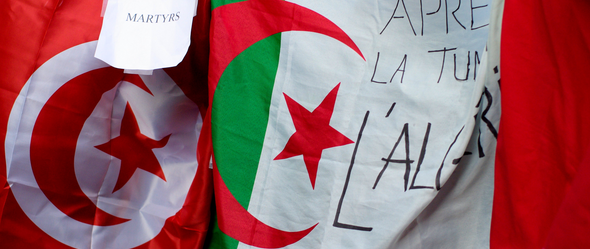’Jasmine Revolution’ jolts EU’s north Africa strategy

EU Observer | 17.01.2011
’Jasmine Revolution’ jolts EU’s north Africa strategy
LEIGH PHILLIPS
EUOBSERVER / BRUSSELS — Sweden’s foreign minister and ex-prime minister, Carl Bildt, has called the EU’s north African strategy a "failure" of democracy in the wake of Tunisia’s ’Jasmine Revolution.’
"Co-operation with countries south of the Mediterranean Sea is particularly important to gradually open up their political and economic systems in order to provide the rapidly growing young people hope and opportunities for the future ... In the case of Tunisia, it is quite obvious that it failed," he wrote in his blog on Saturday (15 January) and Sunday.
His remarks come after Tunisia’s authoritarian leader, Zine el Abidine Ben Ali, long supported by the EU and in particular its southern governments, fled the country to escape the wrath of a popular uprising.
Mr Bildt defended the EU’s support for economic liberalisation in north Africa while criticising its policy of turning a blind eye to human rights abuses.
"Tunisia has had an association agreement with the EU since 1995 and is the only one of the countries south of the Mediterranean which has an FTA with the EU on industrial products. Undoubtedly, this has been important for its economic development," he said. "In retrospect, it is reasonable to ask whether we have been sufficiently robust in the requirements of respect also for democratic rights in Tunisia."
He added that the EU must now support: "first a democratic stabilisation and then a better development opportunity for the country."
"Now the situation is fundamentally altered."
For decades, Europe’s southern member states have embraced a strategy of support for several unsavoury governments in efforts to block irregular immigration, gain access to energy supplies, open up the region’s ecomies and keep a lid on Islamic radicalism.
Mr Ben Ali’s old allies turned their backs on him over the weekend, however. The ousted leader flew to Paris where he was told he was unwelcome. The trip also took in Libya and a refuelling pit-stop in Italy, according to a report on the Al-Bab website. The royal family of Saudi Arabia welcomed him in the end.
In a turn-around from his ministers’ defence of Mr Ben Ali last week, French President Nicolas Sarkozy on Saturday said Paris would now "offer determined support" to the "democratic desires" of the Tunisian people and block suspect financial movements by Tunisians in France.
"French policy is founded on two enduring principles: non-interference in the internal affairs of sovereign states and the support for freedom and democracy," he added.
German Chancellor Angela Merkel called for Tunisia’s new leaders to "move towards the demonstrators and put in place a genuine democracy", adding that it was "absolutely necessary to respect human rights and guarantee freedom of the press and assembly."
For their part, EU foreign affairs chief Catherine Ashton and neighbourhood policy supremo Stefan Fuele announced their support for what is now widely being called the Jasmine Revolution after the flower used as a national symbol.
"We are following with the utmost attention the events in Tunisia," the pair said in a communique. "We want to express our support and recognition to the Tunisian people and their democratic aspirations, which should be achieved in a peaceful way ... In this regard, we urge all parties to show restraint and remain calm in order to avoid further casualties and violence."
Meanwhile the president of the United States, another long-time supporter of the former regime, said: "I condemn and deplore the use of violence against citizens peacefully voicing their opinion in Tunisia, and I applaud the courage and dignity of the Tunisian people."
Over the weekend, despite the flight of their leader, elements of the security apparatus loyal to Mr Ben Ali engaged in gunfights with the Tunisian army. According to al Jazeera, the security forces, the army, the police and irregular militias are each trying to assert control over the situation, while neighbourhood defence committees have sprung up co-ordinated by regular citizens.
The Arab League for its part, describing the events as an "historic phase to which the Tunisian people are witness" also called on Saturday for all Tunisian political forces to "unite".
Over the weekend, unrest continued in fellow Arab league member Algeria. Libya also saw protesters engage in skirmishes with police and attack government offices.





